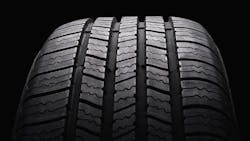Over the years, I’ve used the Chaos Theory several times to describe natural rubber prices because it is a good representation of how agricultural commodity prices can change. For those in need of a refresher, “Chaos” is often used to describe the behavior of complex systems that are sensitive to initial conditions. A common phrase used to describe the theory is “a butterfly flapping its wings in Brazil sets off a tornado in Texas.” Weather is a perfect example of how chaotic systems are almost impossible to predict.
There are a lot of butterflies in the tire industry now and natural rubber is one. As I wrote last month, the International Tripartite Council (ITRC) announced its plan in late 2017 to cut natural rubber exports by 350,000 metric tons in an effort to boost prices. Since then, prices have started to recover and are on an upward tend.
Recently, the Association of Natural Rubber Producing Countries (ANRPC) predicted that global demand will grow 2.8% in 2018 and reported that an early wintering season faced by Chinese rubber farmers has slowed production. If other major rubber-producing countries face the same seasonal conditions, the combination of reduced supply and increased demand could be the perfect storm for ITRC and ANRPC to get the price increases they are looking for.
Another butterfly is oil. Like natural rubber, prices have been on a steady incline over the past few months, and production cuts by the Organization of Oil Exporting Countries (OPEC) are intended to have the same effect. A recent report from the International Energy Agency (IEA) predicts that the U.S. will cover about 80% of the global growth in demand over the next three years. IEA predicts that Canada, Brazil, and Norway will cover the remainder of the growth in demand, which puts OPEC in a difficult position. If OPEC phases out its supply cuts, prices could be pushed down, which it does not want.
On the other hand, if OPEC does nothing, they are ceding market share to the U.S. and other producers. Oil prices over the next few years could be like predicting the weather, but the trend right now is pointing toward higher prices, with most forecasts between $60 and $70 a barrel in 2018. Crude oil prices also have an effect on carbon black, another critical truck tire component. One manufacturer has already announced a price increase this year and like oil, prices are trending upward.
The biggest butterfly right now is steel. By the time this column is printed, we will know if the 25% tariff on imported steel applies to every country, a few countries, or just China. Carve-outs for Canada and Mexico appear to be safe, and there has been talk that exceptions could be made for other U.S. allies. Regardless, the effect on the tire industry could be significant. High-quality steel is critical for truck tire production, and according to the U.S. Tire Manufacturers Association (USTMA), there is no domestic supply of the tire cord-quality steel wire rod produced using oxygen furnace technology.
Electric arc furnace technology, used in domestic steel mills, cannot consistently produce the quality of steel wire rod that truck tire manufacturers require. In many ways, steel is like natural rubber in the sense that we are totally dependent on imports for supply, and together they make up about 42% of the weight in a radial truck tire. So these two raw materials have a direct effect on manufacturing costs.
On March 7, USTMA released a statement outlining the “unintended and substantial negative consequences that trade restrictions on steel imports will have for downstream U.S. manufacturers.” In a letter to President Trump, the association cites Dept. of Commerce Section 232 that allows the exclusion of specific products from tariffs if the U.S. lacks sufficient domestic capacity and asks for such an exemption.
Of course, the domestic steel industry is applauding the tariff, and United States Steel Corp. has already announced plans to restart idle blast furnaces and call back hundreds of steelworkers. In a mid-term election year, this move definitely has political ramifications. Both sides of the aisle are concerned about the potential for trade wars, especially the elected officials running for re-election in states that depend on agricultural exports.
Congress could challenge President Trump on the new tariffs, but it’s unlikely, which means the truck tire industry is hoping for some relief. Hope is a terrible business plan so all factors considered, fleets should be prepared for another round of price increases if they haven’t happened already.
About the Author
Kevin Rohlwing
Kevin Rohlwing is the SVP of training for the Tire Industry Association. He has more than 40 years of experience in the tire industry and has created programs to help train more than 180,000 technicians.
